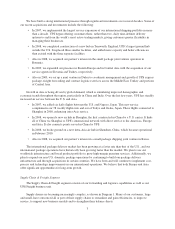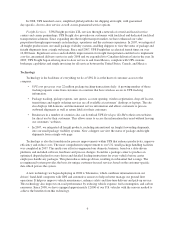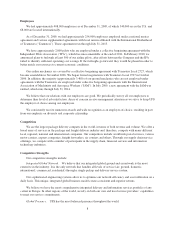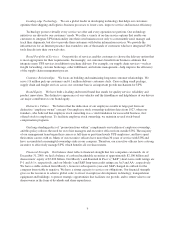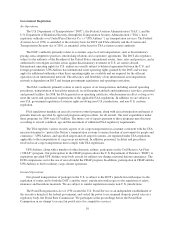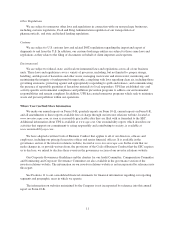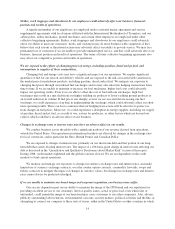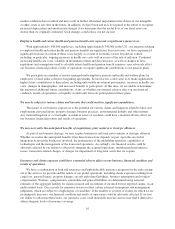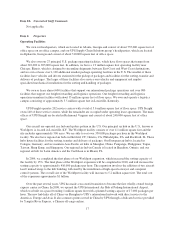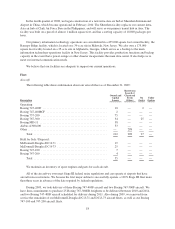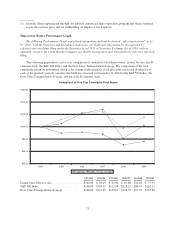UPS 2009 Annual Report Download - page 25
Download and view the complete annual report
Please find page 25 of the 2009 UPS annual report below. You can navigate through the pages in the report by either clicking on the pages listed below, or by using the keyword search tool below to find specific information within the annual report.We face significant competition which could adversely affect our business, financial position and results of
operations.
We face significant competition on a local, regional, national, and international basis. Our competitors
include the postal services of the U.S. and other nations, various motor carriers, express companies, freight
forwarders, air couriers and others. Competition may also come from other sources in the future. Some of our
competitors have cost and organizational structures that differ from ours and may offer services and pricing terms
that we may not be willing or able to offer. If we are unable to timely and appropriately respond to competitive
pressures, our business, financial position and results of operations could be adversely affected.
The transportation industry continues to consolidate and competition remains strong. As a result of
consolidation, our competitors may increase their market share and improve their financial capacity, and may
strengthen their competitive positions. Business combinations could also result in competitors providing a wider
variety of services and products at competitive prices, which could adversely affect our financial performance.
Our business is subject to complex and stringent regulation in the U.S. and internationally.
We are subject to complex and stringent aviation, transportation, environmental, security, labor,
employment, and other governmental laws and regulations, both in the U.S. and in the other countries in which
we operate. Changes in laws, regulations and the related interpretations may alter the landscape in which we do
business and may affect our costs of doing business. The impact of new laws and regulations cannot be predicted.
Compliance with new laws and regulations may increase our operating costs or require significant capital
expenditures. Any failure to comply with applicable laws or regulations in the U.S. or in any of the countries in
which we operate could result in substantial fines or possible revocation of our authority to conduct our
operations, which could adversely affect our financial performance.
Increased security requirements could impose substantial costs on us.
As a result of concerns about global terrorism and homeland security, governments around the world have
adopted or may adopt stricter security requirements that will result in increased operating costs for businesses in
the transportation industry. These requirements may change periodically as a result of regulatory and legislative
requirements and in response to evolving threats. We cannot determine the effect that these new requirements
will have on our cost structure or our operating results, and these rules or other future security requirements may
increase our costs of operations and reduce operating efficiencies.
We may be affected by global climate change or by legal, regulatory or market responses to such potential
change.
Concern over climate change, including the impact of global warming, has led to significant federal, state,
and international legislative and regulatory efforts to limit greenhouse gas (GHG) emissions. For example, in the
past several years, the U.S. Congress has considered various bills that would regulate GHG emissions. While
these bills have not yet received sufficient Congressional support for enactment, some form of federal climate
change legislation is possible in the future. Even in the absence of such legislation, the Environmental Protection
Agency, spurred by judicial interpretation of the Clean Air Act, may regulate GHG emissions, especially aircraft
or diesel engine emissions, and this could impose substantial costs on us. These costs include an increase in the
cost of the fuel and other energy we purchase and capital costs associated with updating or replacing our aircraft
or trucks prematurely. Until the timing, scope and extent of any future regulation becomes known, we cannot
predict its effect on our cost structure or our operating results. Notwithstanding our widely recognized position as
a leader in sustainable business practices, it is reasonably possible, however, that such legislation or regulation
could impose material costs on us. Moreover, even without such legislation or regulation, increased awareness
and any adverse publicity in the global marketplace about the GHGs emitted by companies in the airline and
transportation industries could harm our reputation and reduce customer demand for our services, especially our
air services.
13


